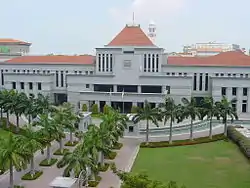Transboundary Haze Pollution Act 2014
The Transboundary Haze Pollution Act 2014 (THCP) is a statute of the Parliament of Singapore that criminalizes conduct which causes or contributes to haze pollution in Singapore, and to provide for related matters such as deterrence. The law is designed specifically to allow legal in suing companies for environmental pollution.
| Transboundary Haze Pollution Act 2014 | |
|---|---|
 | |
| Parliament of Singapore | |
| |
| Enacted by | Parliament of Singapore |
| Enacted | 5 August 2014 |
| Assented to | 10 September 2014 |
| Commenced | 25 September 2014 |
| Status: In force | |
Overview
The THCP is an Act to deter firms or entities in or outside Singapore from taking part in activities that contribute to transboundary haze affecting Singapore. The law targets companies, not countries,[1] which pollute and those that condone pollution by other companies or individuals that they have management control over. Failure to prevent or stop burning may hence lead the culprit to being guilty of an offence under the law, unless steps are taken to stamp out the practice.
The National Environment Agency with the courts are empowered thus in obtaining information on their concessions upon request without the need of relying on the Indonesian authorities, as well as imprisoning and/or fining targeted companies or individuals which pollute, or whose subsidiaries and/or suppliers pollute.[2]
Uses of the Act
With the onset of the El Nino again in 2015, the Transboundary Haze Pollution Act allowed the building of local capacity in dealing with forest fires in Indonesian provinces such as Jambi and Riau. The effectiveness of the new law may depend on the ability to accurately identify errant firms or entities, as well as on law enforcement and cooperation from the Indonesian counterparts.[3] Losses in 2015 estimated at S$700 million were suggested by Environment and Water Resources Minister Masagos Zulkifli due to the haze.[4]
See also
References
- Chan, Francis. "Singapore's Environment Minister Masagos Zulkifli says errant firms must be stopped from producing haze". Straits Times. Retrieved 20 February 2016.
- Sharpe, Samuel (25 September 2015). "Anti-haze law is new, but has potential". Straits Times. Retrieved 20 February 2016.
- Sembiring, Margareth. "Timely for S'pore, Indonesia govts to prove that haze policies work". Straits Times. Retrieved 20 February 2016.
- "Haze cost Singapore estimated $700m last year: Minister Masagos". Asiaone. 16 March 2016. Retrieved 16 March 2016.
